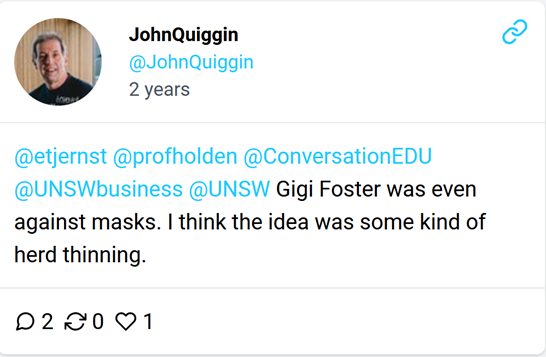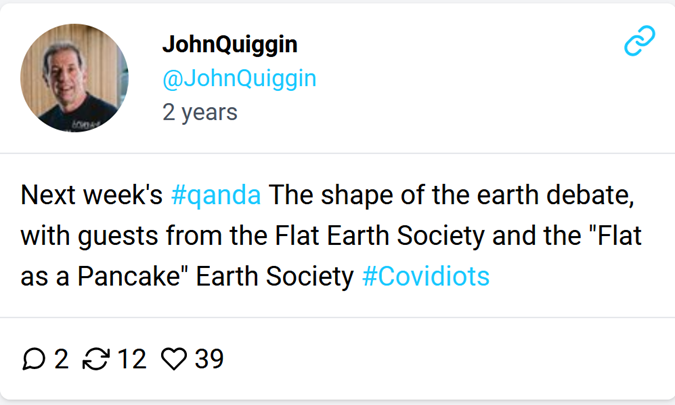A tale of covid-era censorship from the front lines of economics
In March 2024, the journal Australian Economic Papers published our paper, “Hiding the Elephant: The tragedy of Covid policy and its economist apologists.”
The paper was based on invited keynote conference presentations that each of us gave to the online Australian Conference of Economists held in July 2021, and a working-paper version had been published nearly two years earlier. Our paper contained two parts.
The first part was a summary of the cost-benefit analyses of the Covid lockdowns that we and others had generated for Australia, the Netherlands, the UK, and various other countries. The first publicly available version of cost-benefit analyses like these took the form of a blog of March 21st, 2020 called “The Corona Dilemma”, which contained a back-of-the-envelope calculation suggesting that the lockdowns were likely to cost at least 70 life-years’ worth of damages (via lost GDP and direct misery) for every life-year saved.
In our approach to evaluating lockdowns, we had the advantage of being able to use the recently developed WELLBY (wellbeing year) methodology. Framing the policy evaluation question in terms of WELLBYs lost and gained through lockdowns allowed us to see and quantify the huge mental health costs of lockdowns, something missing from QALY-based approaches (quality-adjusted life years). By the time our working paper was released by the Institute of Labour Economics (IZA), some of our cost-benefit analyses had already come out publicly in various formats, including a cost-benefit analysis for the Netherlands published in late 2020, our 2021 book The Great Covid Panic, and both Australian and UK parliamentary proceedings in which we presented our basic numbers. Our most advanced calculation was presented in the 2022 book by Gigi Foster and Sanjeev Sabhlok for Australia, an expansion of a rough sketch provided to the Victorian state parliament in August 2020, which concluded that at a minimum, the societal costs of lockdowns were well over 60 times higher than their benefits.
The second part of our paper was a review of the economic profession’s performance during the Covid era, with particular focus on how many Australian economists had attempted to bully those disagreeing with government policies. We personally began experiencing bullying as early as March 2020. Gigi appeared on national television (ABC’s Q&A program, with hashtag #qanda) on 20 April 2020 and several times subsequently to denounce the lockdowns, prompting vicious media attacks by other economists. We reproduce below two typical examples of public reactions to our efforts by a leading Australian economist:

and

Not surprisingly, John Quiggin removed these tweets from his twitter pages and blocked us from seeing his further tweets. He has never apologised to Gigi for these derogatory comments. He was not alone, however, and we were not the only targets of the intense bullying campaign throughout 2020 directed against economists (and others) who dared to question the wisdom of the lockdowns.
Australian economists by and large quickly signed onto the mainstream narrative. A petition dated April 20 2020 – the day of Gigi’s abovementioned Q&A appearance – that was eventually signed by hundreds of economists in Australia professed a deep commitment to lockdowns, and claimed without evidence that lifting the lockdowns would be catastrophic for both the economy and health. A spate of public contributions by Australian economists justified the lockdowns after the fact, drawing on highly unusual arguments. A leading example is a Conversation piece by Richard Holden and Bruce Preston arguing that it would be immoral to put more weight on saving someone with many years of life left to live than on saving someone a minute away from death.
The saga we personally experienced at academic journals in trying to publish our paper was similarly instructive.
Invited keynotes to the Economic Society of Australia’s Australian Conference of Economists (ACE) are normally published in a special conference issue of the Society’s journal, the Economic Record. The editor of that year’s special issue, Jakob Madsen, oversaw the handling of our paper. Per standard practice, Jakob put the paper through several rounds of peer review, after which he approved the paper subject to what he described as very minor changes, saying explicitly that he wanted to publish the paper. With the standard peer review process complete, the managing editor of the Economic Record, Renée McKibbon, suddenly became involved, seemingly at her own behest. Renée was the wife of one of the pro-lockdown economists whose work we evaluated critically in the paper, and hence in our view her judgment on anything to do with the paper could not be seen as objective, and we made this view known to Jakob. Renée proceeded to take a series of actions that resulted in the paper being pulled. She claimed there were legal issues, although she never shared a legal opinion, and she directed Jakob to request a spate of additional changes that amounted to the omission of the entire second half of the paper plus significant softening of the first half. In an about-face to his prior position, Jakob requested the complete re-write and neutering that she wanted. This request was later defended by the publisher as the result of Renée judging that the paper, despite presenting material that the Economic Society had expressly invited to be presented at its flagship annual conference, was not in alignment with the scope of the Society’s journal – a basic judgment that one might reasonably expect the special issue editor to competently make before sending the paper to referees. At this point we decided to offer the paper to another journal.
At the invitation of initially supportive Ross Guest, whom we had approached asking whether the paper might fit into a special issue he was co-editing of Economic Analysis and Policy (EAP) in honour of Tony Makin, we then submitted the paper to EAP. We ended up pulling the paper from consideration from that journal too when Ross appeared to change his mind after the other co-editor of the special issue reacted to our paper with censorious revision requests like what we had received from the Economic Record.
We then submitted the paper to Australian Economic Papers for a special issue on the economics of catastrophes, whose editor Rachel ViforJ accepted it. However, the AEP publisher, Wiley, then held up publication because of a footnote contained in the accepted version of the paper that read as follows:
This paper, combining our two keynote addresses at the 2021 Australian Conference of Economists, was originally submitted to the Economic Record for its ACE 2021 Papers Special Issue being guest-edited by Jakob Madsen. We detail below what happened with that submission, as it was a classic case of the very censorship that we discuss in this paper.
As acceptance neared toward the end of a lengthy R&R process involving five external referees, Renée McKibbin, Managing Editor of the Economic Record and wife of Warwick McKibbin who is portrayed negatively in this paper, took over from Jakob and overruled the opinions of him and the five referees. She required that the latter half of the paper be excised in total and the exposition altered elsewhere to remove many elements of value, such as policy suggestions, evidence of controversy, relation to international law, and evidence of collateral damage. Jakob acted in accordance with her wishes, despite our warnings that Renée was clearly facing a conflict of interest given what the paper says about her husband. We refused to eviscerate our paper in response to these censorious demands. A subsequent submission to Economic Analysis and Policy for the Special Issue in honour of Tony Makin met a similar fate.
Wiley – also the publisher of the Economic Record – then had its ‘Integrity in Publishing’ unit review the saga. It concluded that Renée had done nothing wrong, while assigning itself the right to interfere with the accepted paper by insisting its first footnote be omitted, allegedly due to that footnote revealing ‘confidential information’ about the peer review process. We offered several edited versions of this footnote that retained meaning, but Wiley would not compromise. The footnote in the published version of the paper thus reads as follows:
In the version of this paper accepted for publication, this footnote disclosed our experiences in trying to publish this paper elsewhere prior to its publication in this journal, which we view as a case of censorship of our commentary on COVID-19 policies in Australia. After the paper was accepted at Australian Economic Papers, the publisher Wiley asked us to remove this footnote. They objected to it on the grounds that a panel from the publisher’s Integrity in Publishing Group did not agree with us that censorship had taken place, and that sharing the content of our footnote would violate their policies around the confidentiality of the peer review process. We disagree with the panel’s assessment and it remains our view that censorship of our COVID-19 commentary has taken place. We extend our most heartfelt appreciation to AEP managing editor Rachel ViforJ for her perseverance in seeing this paper published.
The story of this paper is a microcosm of how modern censorship and scientific selling-out now works. When groupthink strikes and scientific opinions become inconvenient, the first go-to strategy is bullying of dissent on social media and in public, gleefully carried out by defenders of the new faith within the academic professions. Publication of the eventual paper is then delayed and blocked on spurious grounds by editors and publishing house representatives willing to overlook actual problems (like real conflicts of interest) and run with fanciful and unsupported arguments that are presented using scary words (like ‘defamation’, ‘integrity’, and ‘breaches of confidentiality’). This method works to make other academics fearful enough that they censor both themselves and those brave enough to nevertheless do independent research, further delaying publication. Even once brave editors are found who will support the paper, publishers will hide inconvenient truths about journals and editors in their stables, abusing their own procedures to give themselves powers of censorship they were never supposed to have.
All this is one of the many reasons we have set up a new academy, Nova Academia (novacad.org), where we intend to teach real economics and critical thinking to smart students from September 2024 onwards in a picturesque castle in Belgium. Do check it out, join us, alert potential students before the limited places are taken – and watch this space for a new journal that will welcome submissions of courageous research in social science.

About Paul Frijters

Paul Frijters is visiting emeritus professor of Wellbeing Economics at the London School of Economics, Social Policy; Professor of Economics at MBS college Saudi Arabia; and Academic Director of Nova Academia.
About Gigi Foster

Gigi Foster is Professor of Economics at the University of New South Wales, Sydney Australia; co-founder of Australians for Science and Freedom; an award-winning teacher; and a prolific writer and media commentator.